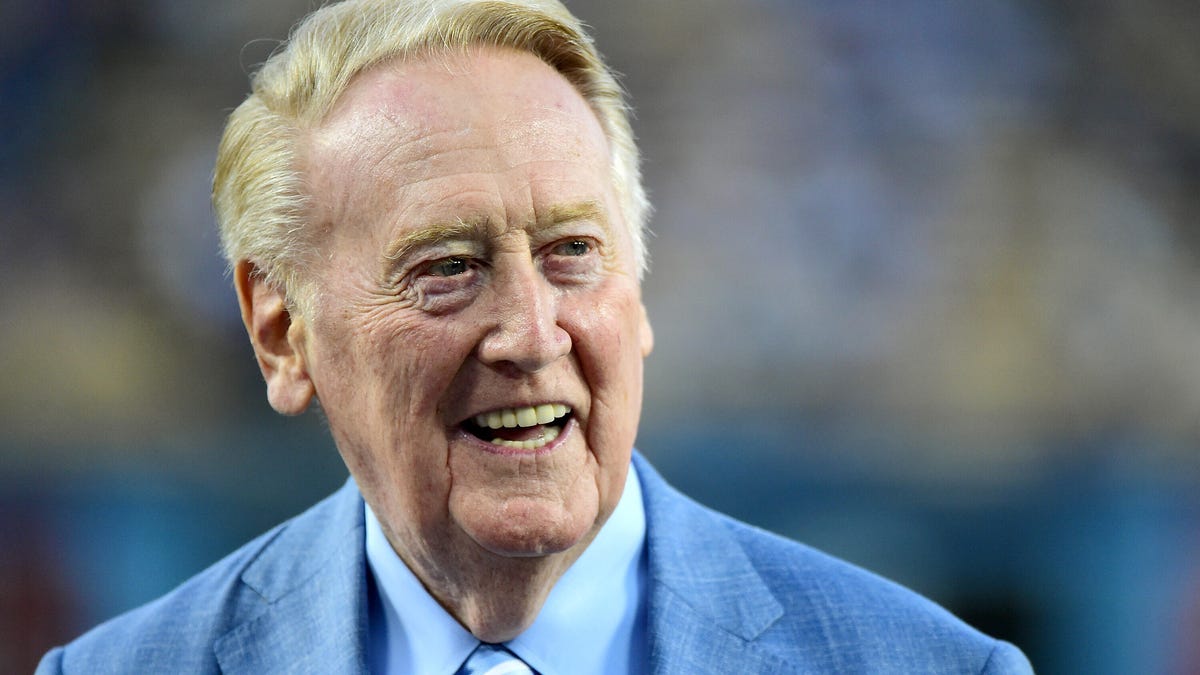Vin Scully, Legendary Voice of the Dodgers for 6 Decades, Dies at 94
In a career that spanned Jackie Robinson, Fernando Valenzuela and Clayton Kershaw, Scully endeared himself to fans of every team with his folksy but straightforward ways.

Vin Scully in 2015, the year before he retired from a 67-year-long broadcasting career.
Vin Scully, the beloved Dodgers broadcaster who informed and entertained generations of baseball fans over a career that lasted six decades, died Tuesday at the age of 94.
Scully's death was announced Tuesday evening by the Los Angeles Dodgers.
"We have lost an icon," Dodgers President and CEO Stan Kasten said in a statement. "His voice will always be heard and etched in all of our minds forever."
His folksy manner, typified by his broadcast greeting of "Hi, everybody, and a very pleasant good evening to you wherever you may be," transcended generations of baseball lore.
His career began when the team was still in Brooklyn and Jackie Robinson and Pee Wee Reese were fixtures on the field. He followed the team when it moved west, regaling fans over the next five decades with the play of such Dodger greats as Sandy Koufax, Steve Garvey, Fernando Valenzuela and Clayton Kershaw.
"Nobody understands baseball the way Vin Scully does," Jim Murray, the Pulitzer Prize-winning sports columnist for the Los Angeles Times, wrote in 1983. "Scully is the world's best at filling the dull times by spinning anecdotes of the 100-year lore of the game.
"He can make you forget you're watching a 13-3 game ... and take you with him to a time and place where you are suddenly watching Babe Ruth steal home," Murray wrote. "He is like a marvelous raconteur who can make you forget you're in a dungeon."
Scully usually worked alone, providing both color and play-by-play during his broadcasts, delivering often overlooked factoids and decades of perspective. And although he was paid by the Dodgers, Scully was as impartial as a broadcaster comes, both praising an opponent's play and criticizing a Dodger manager's decision.
"I guess it's kind of a running commentary with an imaginary friend," is how he described his approach to the job in an interview in 2016, his final season before retiring from broadcasting.
After a brief stint with CBS in Washington, DC, Scully began his Dodgers radio and TV career in 1950 with future Hall of Fame broadcaster Red Barber. Three years later, the 25-year-old Scully became the youngest person to broadcast a World Series game.
"Vin Scully was one of the greatest voices in all of sports. He was a giant of a man, not only as a broadcaster, but as a humanitarian," Kasten said. "He loved people. He loved life. He loved baseball and the Dodgers."
Born in the Bronx on Nov. 29, 1927, Vincent Edward Scully was only 7 when his father died of pneumonia and his mother moved the family to Brooklyn, home of the Dodgers.
Scully grew up playing stickball in the streets and listening to college football games on the family's radio. After playing outfield for two years on the Fordham University baseball team, Scully began broadcasting games for the college radio station.
Scully moved to California with the Dodgers in 1958, and over the course of his 67-year career, he would call three perfect games -- Don Larsen in the 1956 World Series, Sandy Koufax in 1965 and Dennis Martinez in 1991 -- and 18 no-hitters.
Scully was broadcasting the Dodgers-Braves game in 1974 when Hank Aaron hit his 715th home run to break Babe Ruth's record in 1974.
"A Black man is getting a standing ovation in the Deep South for breaking a record of an all-time baseball idol," Scully told listeners, well aware of the cultural significance. "What a marvelous moment for baseball."
He also is remembered for calling Kirk Gibson's dramatic pinch-hit homerun during Game 1 of the 1988 World Series, pitting the Dodgers against the Oakland Athletics. "In a year that has been so improbable, the impossible has happened," Scully said as Gibson gave his iconic fist pump rounding the bases after his homerun ball sailed over the right-field fence to give the Dodgers a 5-4 victory.
Scully was inducted into the Baseball Hall of Fame in 1982, and Dodger Stadium's main gate was named in his honor in 2016, among many accolades.
Always a fan favorite, Scully made a handful of appearances at Dodger Stadium after retiring in 2016. Despite his popularity across the spectrum of sports, he said in 2016 that he didn't want to be remembered as a sportscaster but rather "the very normal guy that I am. I just want to be remembered as a good man, an honest man, and one who lived up to his own beliefs."
In 2020, Scully auctioned off personal memorabilia from his decades in sports, raising more than $2 million, a portion of which was donated to research into ALS, also known as Lou Gehrig's Disease. He was preceded in death by his wife of 47 years, Sandra, who died in 2021 from complications of ALS at age 76.

